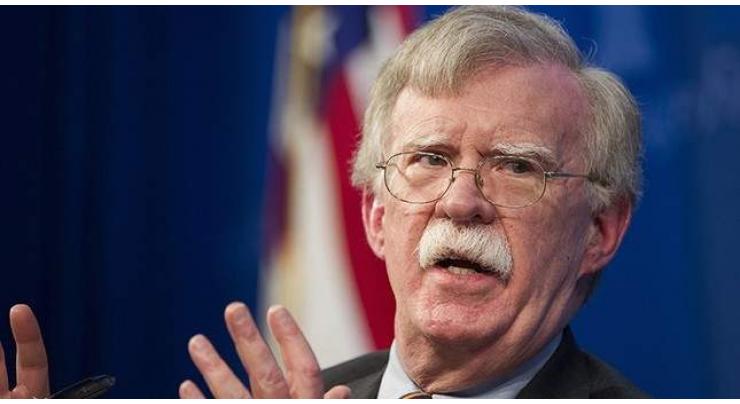
White House Asked Pentagon To 'draw Up Plans To Strike Iran' : Report
Umer Jamshaid Published January 14, 2019 | 04:06 PM

The White House requested options for a military strike against Iran last September, the Wall Street Journal reported Monday, citing current and former US officials
NEW YORK, (UrduPoint / Pakistan Point News - 14th Jan, 2019 ) :The White House requested options for a military strike against Iran last September, the Wall Street Journal reported Monday, citing current and former US officials. The request, reportedly made the National Security Council led by National Security Advisor John Bolton, alarmed Pentagon and State Department officials, the newspaper said. The Council made the move after an "Iranian-aligned group" fired missiles into Baghdad's diplomatic quarter, which hosts the US embassy in Iraq. No one was harmed.
Meanwhile, The New York Times cited senior Pentagon officials as expressing "deepening fears" that Bolton, whom the newspaper called "hawkish," could precipitate a conflict with Iran at a time when President Donald Trump is losing leverage in the middle East by pulling out American troops.
According to the Wall Street Journal, it remains unclear whether President Trump himself knew about the request, whether the Pentagon ultimately delivered military options to the White House, and if concrete attack plans against the Islamic Republic were actually formulated. But officials who spoke to the newspaper confirmed that the Defence Department did indeed comply with the National Security Council's request to develop those options. Bolton, an avid proponent of the Iraq invasion during the George W. Bush administration, has long taken one of the hardest lines against Iran in Washington and has openly supported the idea of regime change in Tehran.
Garrett Marquis, a spokesman for the National Security Council told The Journal, "We continue to review the status of our personnel following attempted attacks on our embassy in Baghdad and our Basra consulate, and we will consider a full range of options to preserve their safety and our interests." Bolton, 70, a former US ambassador to the United Nations, is not the only Iran hawk in Trump's circle of top advisers, The New York Times pointed out. Secretary of State Mike Pompeo declared in a speech at the American University in Cairo last week that "countries increasingly understand that we must confront the ayatollahs, not coddle them.
" Earlier this month, he warned Iran against launching three spacecraft, describing them as a pretext for testing missile technology that is necessary to carry a warhead to the United States and other nations. His statement appeared aimed at building a legal case for diplomatic, military or covert action against the Iranian missile program. "It was surprising because Iran has used these modest space missions, mostly to deploy satellites, since 2005," the Times said. The senior American official said that the Pentagon and the intelligence agencies disagreed with Pompeo's interpretation of the threat posed by the satellite launches. Speaking on Sunday on CBS's "Face the Nation" during a visit to Abu Dhabi, in the United Arab Emirates, Pompeo discounted the argument that Trump's decision to withdraw 2,000 American troops from Syria in the coming months undercuts Washington's ability to achieve its other goals in the region. "That certainly includes in Syria," he said. "It certainly includes into Iran, if need be." But Pompeo also opposed the idea of an airstrike on Iran after its attack on the embassy, according to a former senior administration official. On Sunday, he declined to comment about The Journal's report. On each stop of his Middle East trip, Pompeo, a former Army officer, has spoken of the need to counter Iran, but has not talked of military action. When Bolton's predecessor, H.R. McMaster, then a three-star Army general, took over as national security adviser in early 2017, he ordered a new overall war plan for Iran. Gen Mattis, the former Pentagon chief, who is himself an Iran hawk from his days as a Marine Corps commander in the region, delivered options. But those plans were not for the kind of pinpoint strikes that Bolton envisioned after the attack on the American Embassy on Sept. 6.
Related Topics
Recent Stories

Experts raise concerns over introduction of 10-stick packs

Iranian president arrives in Karachi

Law Minister expresses Govt's resolve to address issue of missing persons

Rizwan’s batting order may be changed: Sources

Nawaz Sharif to visit Guangzhou exhibition in China

FM Dar not traveling to China: Foreign Office

PM takes notice of deliberate delay in tax cases

Iranian President visits Allama Iqbal’s mausoleum

Iranian President arrives in Lahore today

Currency Rate In Pakistan - Dollar, Euro, Pound, Riyal Rates On 23 April 2024

Today Gold Rate in Pakistan 23 April 2024

Islam enlightened world with its teachings about knowledge: Dr Jamileh
More Stories From Pakistan
-
Delegation of Girls Guide Association visits Virtual Women Police Station
8 minutes ago -
Govt's priority to protect life, property of people: DC
18 minutes ago -
DC directs cleaning of drains ahead immediately ahead of rain
18 minutes ago -
AJK Govt releases long awaited funds for local councils
18 minutes ago -
Punjab govt wants to address travelling problems of student through motorbike scheme: minister
27 minutes ago -
Mirpurkhas to observe World Immunization Week
28 minutes ago
-
Rs.788.8m fine imposed on 7523 electricity thieves, 6159 arrested in 227 days: FESCO spokesman
28 minutes ago -
International vloggers witness National Assembly session
28 minutes ago -
SSGCL to suspend gas supply in Balochistan on April 24 to repair pipelines
38 minutes ago -
Ayaz reaffirms resolve to further deepen fraternal Pak-Saudi ties
38 minutes ago -
Man arrested over grabbing land through fake stamp paper
38 minutes ago -

Iranian president arrives in Karachi
39 minutes ago
